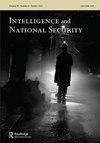Uncivil War: the British Army and the Troubles, 1966-1975 Uncivil War: the British Army and the Troubles, 1966-1975 , by Huw Bennett, Cambridge, Cambridge University Press, 2023, 427 pp., £25 (Hbk), ISBN: 9781107136380
IF 0.8
3区 社会学
Q1 HISTORY
引用次数: 0
Abstract
"Uncivil War: the British Army and the Troubles, 1966-1975." Intelligence and National Security, ahead-of-print(ahead-of-print), pp. 1–2 Disclosure statementNo potential conflict of interest was reported by the author(s).Notes1. Charles Townshend, The British Campaign in Ireland, 1919–1921: The development of political and military policies. Oxford: Oxford University Press, 1975.2. Edward Burke, An Army of Tribes: British Army Cohesion, Deviancy and Murder in Northern Ireland. Liverpool: Liverpool University Press, 2018.3. J. Bowyer Bell, A Time of Terror: How Democratic Societies Respond to Revolutionary Violence. New York: Basic Books, 1978, 131.4. The BAOR was the United Kingdom’s main land contribution to NATO. Headquartered at JHQ Rheindahlen in West Germany between 1954 and 2013. The BAOR was commanded by a general and consisted – in peacetime – of British I Corps and supporting units. In 1969 the BAOR deployed some 53,000 troops.5. The PIRA emerged in December 1969 after a split within the IRA and the Irish Republican movement. By 1972 it had succeeded the Official IRA (OIRA) as the dominant Republican paramilitary organisation.6. The MRF was a covert intelligence-gathering and counterinsurgency unit of the British Army. It was formed in Northern Ireland in 1971 and disbanded in late 1972.《非内战:英国军队与动乱,1966-1975》,休·贝内特著,剑桥,剑桥大学出版社,2023年,427页,25英镑(Hbk), ISBN: 9781107136380
《非内战:1966-1975年英国军队与麻烦》《情报与国家安全》,印前(ahead-of-print),第1-2页。披露声明作者未报告潜在利益冲突。查尔斯·汤森:《英国在爱尔兰的战役,1919-1921:政治和军事政策的发展》。牛津:牛津大学出版社,1975.2。爱德华·伯克:《部落军队:北爱尔兰的英国军队凝聚力、叛变与谋杀》。利物浦:利物浦大学出版社,2018.3。J.鲍耶·贝尔:《恐怖时代:民主社会如何应对革命暴力》。纽约:基础图书,1978,131.4。BAOR是英国对北约的主要陆上贡献。1954年至2013年间,总部位于西德莱茵达伦JHQ。BAOR由一名将军指挥,在和平时期由英国第1军和支援部队组成。1969年,BAOR部署了大约53,000名士兵。爱尔兰共和军和爱尔兰共和运动分裂后,PIRA于1969年12月成立。到1972年,它已接替官方爱尔兰共和军(OIRA)成为占统治地位的共和派准军事组织。MRF是英国陆军的秘密情报收集和反叛乱部队。它于1971年在北爱尔兰成立,并于1972年底解散。
本文章由计算机程序翻译,如有差异,请以英文原文为准。
求助全文
约1分钟内获得全文
求助全文
来源期刊

Intelligence and National Security
Multiple-
CiteScore
1.80
自引率
41.70%
发文量
93
期刊介绍:
Intelligence has never played a more prominent role in international politics than it does now in the early years of the twenty-first century. National intelligence services are larger than ever, and they are more transparent in their activities in the policy making of democratic nations. Intelligence and National Security is widely regarded as the world''s leading scholarly journal focused on the role of intelligence and secretive agencies in international relations. It examines this aspect of national security from a variety of perspectives and academic disciplines, with insightful articles research and written by leading experts based around the globe. Among the topics covered in the journal are: • the historical development of intelligence agencies • representations of intelligence in popular culture • public understandings and expectations related to intelligence • intelligence and ethics • intelligence collection and analysis • covert action and counterintelligence • privacy and intelligence accountability • the outsourcing of intelligence operations • the role of politics in intelligence activities • international intelligence cooperation and burden-sharing • the relationships among intelligence agencies, military organizations, and civilian policy departments. Authors for Intelligence and National Security come from a range of disciplines, including international affairs, history, sociology, political science, law, anthropology, philosophy, medicine, statistics, psychology, bio-sciences, and mathematics. These perspectives are regularly augmented by research submitted from current and former intelligence practitioners in several different nations. Each issue features a rich menu of articles about the uses (and occasional misuses) of intelligence, supplemented from time to time with special forums on current intelligence issues and interviews with leading intelligence officials.
 求助内容:
求助内容: 应助结果提醒方式:
应助结果提醒方式:


